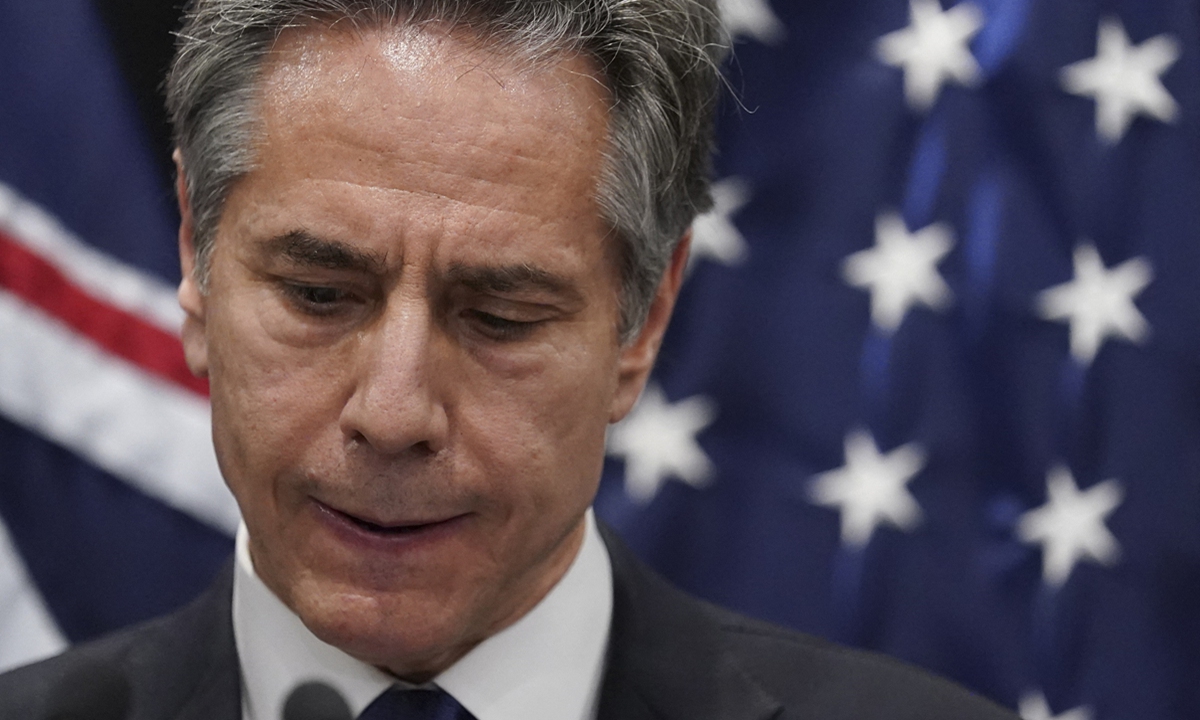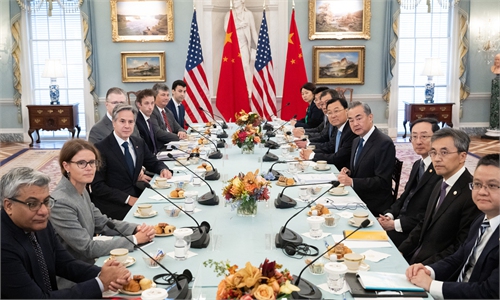Blinken's 'Indo-Pacific' tour suggests 'fusty bloc politics' around China's neighborhood

US Secretary of State Antony Blinken Photo: AFP
US Secretary of State Antony Blinken is about to kick off his "Indo-Pacific" tour next week, which includes stops in Japan, South Korea and India, with discussions on hot-spot issues and forging closer ties expected to be highlighted.
Analysts said on Thursday that Blinken's upcoming trip shows a strong sense of bloc politics, suggesting that the US will further influence the security and geopolitical environment around China by manipulating its allies, which will bring more risks and turbulence to the region.
According to a press statement from the US Department of State, Blinken will lead delegations to Tokyo, Seoul, and New Delhi "to advance collaborative efforts to support a free and open Indo-Pacific region that is prosperous, secure, connected, and resilient," after his tour to Israel and Jordan on the current Palestine-Israel conflict.
In Tokyo, Blinken will participate in the second G7 Foreign Ministers' Meeting of 2023 and meet with Japanese Prime Minister Fumio Kishida to discuss "bilateral priorities," including the Ukraine crisis and strengthening cooperation in the "Indo-Pacific" region, according to the US Department of State.
In the planned meeting with South Korean president Yoon Suk-yeol in Seoul, "Russia's growing military cooperation with North Korea" and escalating tensions in the Middle East are expected to be discussed, according to Yohnap.
In Tokyo and in Seoul, Blinken will underscore the US' "ironclad commitment" to the defense of Japan and South Korea and reaffirm the "importance of robust and sustained trilateral engagement" following the Camp David Summit in August, said US Department of State spokesperson Matthew Miller.
In his final stop in New Delhi, Blinken, along with the US Defense Secretary Lloyd Austin, will meet with India's foreign minister Subrahmanyam Jaishankar and the country's defense minister Rajnath Singh to discuss the "Indo-Pacific" situation.
Li Haidong, a professor at the China Foreign Affairs University, told the Global Times on Thursday that Blinken's trip, and the US' frequent mention of the "Indo-Pacific", showed its intention to further strengthen its alliance structure in the Asia-Pacific region and China's neighborhood, and by manipulating and influencing its allies, to re-establish its "hegemony" in the region.
In its "Indo-Pacific" strategy, the US is still pushing ahead with deployments dominated by strategic competition with China, which at its core consists of reinforcing alliances, and at the same time requires allies to share the US cost and depletion, Li said.
The US is creating a torn and divisive picture of the region's overall security, which is bound to create more crises and turmoil in the Asia-Pacific region, he warned.
During his meeting with Blinken last week, Chinese Foreign Minister Wang Yi stressed that the two countries should work to return their relations to the track of healthy, stable, and sustainable development as soon as possible. However, the US' latest hype of a Chinese fighter jet intercepting US military aircraft in the South China Sea shows China-US relations will be characterized by dialogue and tensions in parallel, analysts said.
It is true that the Wang-Blinken meeting was constructive in stabilizing bilateral relations, but for the time being, the stabilization will have very little effect on the US approach of competing with China by leveraging the strength of its allies, Li said.
Washington's goal is to gradually put China at a disadvantage, and can better achieve it within the guardrail of the general stability of the US-China relationship, he said.
The US intervention in "Indo-Pacific affairs" through small blocs, and forcible creation of a rift in the region, in essence, continues to follow its fusty concepts and practices of the Cold War, which exemplifies the barren nature of US diplomacy, the expert remarked.



